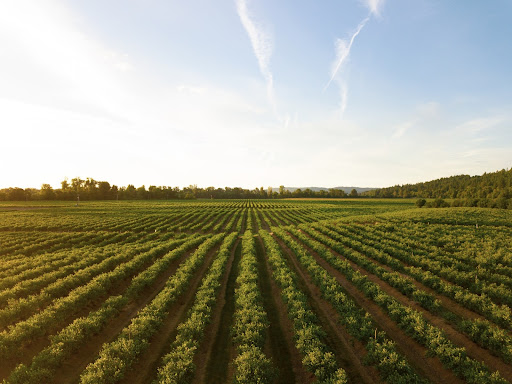How Can Modern Technology Be Used To Improve Agriculture

Agriculture is an industry that has been around for as long as humans have been farming. In the past, it was all about manual labor and largely depended on weather conditions, but today technology has changed everything.
The advent of modern technology in agriculture means that there are new ways to get better yields while using less water, time, and even manpower! From autonomous tractors designed for row crops to artificial intelligence-powered robots, the world of agriculture is rapidly transforming.
In this article, we will explore how these innovations can help improve the agricultural industry – not just in one country or region but across the globe. We’ll also show you some practical solutions that will give you a sense of what’s possible right now with modern tech applied to agriculture.
High Crop Productivity Using Modern Technology
For decades, farmers have been using the same technology to farm. While there’s nothing wrong with this method, experts believe that new technologies can lead to high yield corn and improve crop yields irrespective of what you plant. One example is precision agriculture. This technique uses various hardware and software solutions to maximize soil fertility while minimizing costs associated with pesticides, fertilizers, water usage, labor, and other factors.
For example, with the help of drones equipped with multispectral sensors, farmers now have access to imagery that shows them the status of their crops in real-time. This information can be used to make timely adjustments, such as where to apply fertilizers and how much water should be used on each crop. Harvesting is also made easier with self-driving tractors and drones that can monitor fruit quality. This lets the farmer know which crops are ready for gathering, allowing them to increase their revenue by harvesting at the right time.
Decreased Use of Water and Fertilizers
Since the early stages of human civilization, farmers have been using natural fertilizers during farming. However, natural fertilizers are very difficult to produce because they need time, sunlight, and other factors that can be hard to find in some regions. That’s why experts believe that synthetic fertilizers are the future of agriculture since they can be produced quickly and can achieve better yields at a lower cost.
Another disruptive innovation in the world of agriculture is drought-resistant crops, which are grown with less water than normal crops. These agricultural marvels use various genetic modifications that allow them to survive even when faced with drought conditions. This helps farmers save money on water irrigation costs while maximizing the productivity of their farms.
Rise of the Farm Robots
Although a lot of farms still rely on manual labor, there’s a steady shift toward more automated solutions. Not only does this help improve overall productivity, but it also cuts costs – you can watch an example here. What’s fascinating about modern robot technology is that these autonomous machines are designed to perform a single task that’s related to harvesting. For example, some robots are built to identify ripe fruits and then use tractors or carts to transport them for packaging.
In the future, human involvement in agriculture is expected to decrease as machine automation becomes more efficient at performing most tasks involved in farming.
Reduced Impact On Natural Ecosystems
It’s not an overstatement to say that modern agricultural practices have done a great deal of damage to natural ecosystems. In fact, most large-scale farms didn’t even consider the impact on the surrounding environment. Today, however, it’s becoming more commonplace for farmers and companies involved with agriculture to use new technologies that meet high environmental standards. This is not only great for the planet, but it also makes farming more sustainable in the long run.
For example, there are farms that use aquaponics to produce crops with little human involvement. This agricultural practice essentially imitates natural ecosystem processes by using bacteria and fish to fertilize plants while they grow. There’s also hydroponics, which uses various methods to grow plants with minimal soil.
Less Runoff of Chemicals Into Rivers and Groundwater
Another major problem in the agricultural industry is the runoff of chemicals that gets into rivers and groundwater. This can have a massive impact on aquatic ecosystems that ultimately affect humans, who rely on these sources of water for drinking. In order to improve water quality while maximizing yields, many innovative companies are developing new technologies that reduce chemical runoff, increase soil retention, and prevent evaporation.
What’s great about the way modern technology improves agriculture is that it puts people first. This means that new technologies are often designed to increase productivity while still protecting the environment and the ecosystem. That way, everyone involved in this industry can do what they’re best at while improving how the entire process works. For example, some farms are creating platforms above streams that trap chemicals before they drain into the waterway.
Sustainable Food Production for a Growing Population
The world is currently facing an unprecedented population boom. To maintain food security in the future, experts believe that more sustainable agricultural practices will be necessary to keep up with demand.
To meet this need for increased production, many farms are turning to innovative methods like vertical farming and securing funding. Although it’s still in its early stages, vertical farming can yield better results than traditional agriculture using less space and fewer resources – you can read more about it here.
Food Can Be Cheap Without Sacrificing Nutritional Value
When it comes to food, most people are concerned about two things: its price and nutritional value. For the first time in history, these features can be found together in affordable food options made possible by modern technology. With large-scale farms becoming more automated than ever before, farmers are able to produce crops faster with higher yields. This, in turn, can help keep prices low while maintaining nutritional value.
In the future, it’s expected that the bulk of food production will be done using a combination of machine automation and sustainable farming practices. As a result, farms will become more efficient and affordable, which will ultimately benefit both farmers and consumers all over the world.
Many modern agricultural advancements are designed to help farmers produce more food using fewer resources, which is an important step toward keeping the planet healthy as our population increases over time.





